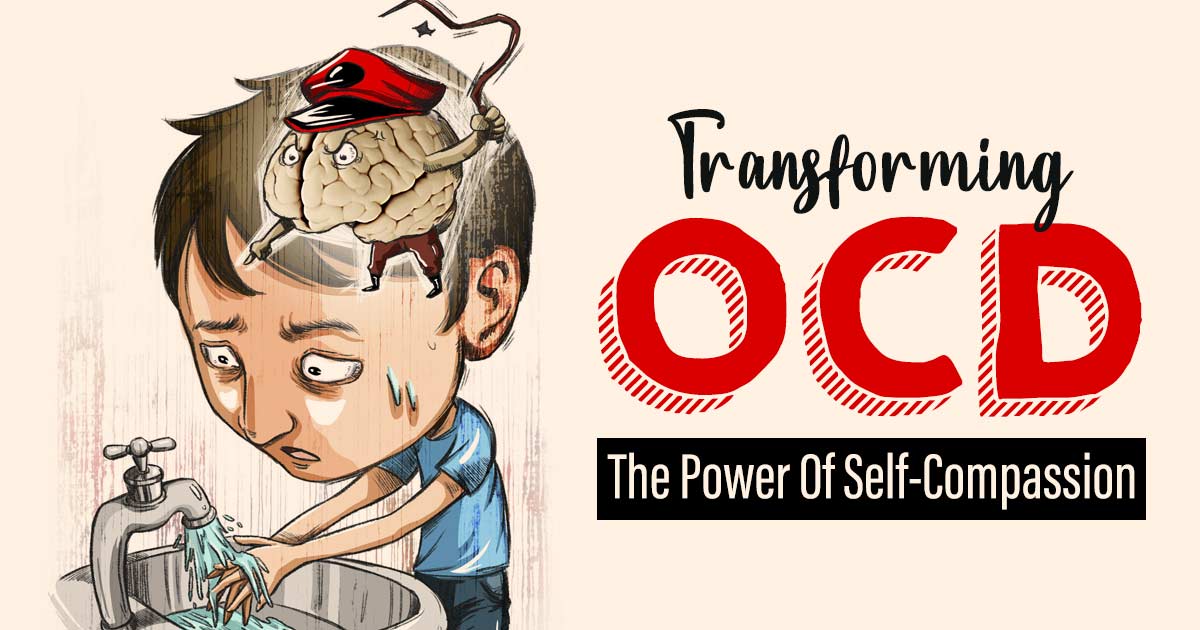Obsessive-Compulsive Disorder (OCD) is a debilitating mental health condition characterized by intrusive thoughts (obsessions) and repetitive, ritualistic behaviors (compulsions). It affects millions of people worldwide, significantly impairing their daily lives.
While cognitive-behavioral therapy (CBT) is the primary evidence-based treatment for OCD, the importance of self-compassion in OCD treatment is often underestimated.
Understanding OCD
Before delving into the role of self-compassion in OCD treatment, it is essential to grasp the nature of OCD itself. OCD is characterized by persistent, distressing obsessions, which are unwanted and intrusive thoughts, images, or urges. These obsessions trigger anxiety, leading individuals to engage in compulsive behaviors or mental rituals to alleviate the anxiety or prevent a feared outcome.
OCD can be all-consuming, causing severe distress and disrupting daily life, relationships, and work or school functioning. The obsessions and compulsions often revolve around themes such as contamination, harm, symmetry, or taboo thoughts. Common compulsions include washing, checking, counting, and seeking reassurance.
The Role Of Traditional Treatment
Cognitive-behavioral therapy, particularly exposure and response prevention (ERP), is the gold standard treatment for OCD. ERP involves exposing individuals to their obsessional triggers while preventing the use of compulsions. Through repeated exposure, individuals learn to tolerate the distressing thoughts and reduce their compulsive responses.
Traditional treatment techniques like ERP are highly effective, with many individuals experiencing significant symptom reduction or remission. However, OCD can be a chronic condition, and treatment success can be influenced by various factors, including the individual’s willingness to engage in therapy and the severity of their symptoms.
The Importance Of Self-compassion In OCD Treatment
While ERP and other CBT techniques are essential components of OCD treatment, they may not address the emotional suffering and self-criticism that often accompany the disorder. This is where self-compassion becomes paramount.
Self-compassion refers to treating oneself with the same kindness, understanding, and care that one would offer to a friend in times of suffering or difficulty. Here’s why self-compassion is vital in OCD treatment:
1. Reducing Self-Criticism:
Individuals with OCD frequently engage in self-blame and harsh self-criticism for their obsessions and compulsions. They may feel ashamed, defective, or “crazy.” Self-compassion helps counteract this self-criticism by fostering self-kindness and self-acceptance. It encourages individuals to recognize that OCD is a mental health condition, not a personal failing.
2. Emotional Regulation:
OCD often leads to intense emotions, particularly anxiety and guilt. Self-compassion helps individuals regulate these emotions by promoting a non-judgmental attitude toward their experiences. It allows individuals to acknowledge their feelings without overwhelming self-condemnation.
3. Enhancing Motivation:
Engaging in ERP can be challenging and distressing. Self-compassion serves as a source of motivation and self-support during the difficult moments of treatment. It helps individuals persist in therapy, knowing they deserve relief from their suffering.
4. Breaking The Cycle Of Avoidance:
One hallmark of OCD is avoidance of situations, places, or thoughts that trigger obsessions. Self-compassion empowers individuals to confront these triggers with greater resilience, as they learn to approach their obsessions and compulsions with self-kindness and understanding.
5. Promoting Forgiveness:
OCD often involves ruminating about past mistakes and obsessing over future uncertainties. Self-compassion encourages individuals to forgive themselves for perceived errors and to let go of the constant need for certainty and control.
Techniques Of Self-compassion In OCD Treatment
Incorporating self-compassion into OCD treatment can be transformative. Here are some practical techniques that individuals and therapists can utilize:
1. Mindfulness Meditation:
Mindfulness practices can help individuals observe their thoughts and feelings without judgment. It allows them to become more aware of their self-critical inner dialogue and replace it with self-compassionate responses.
2. Self-Compassion Exercises:
Individuals can engage in self-compassion exercises, such as writing compassionate letters to themselves or using self-compassion scripts. These exercises can be used when facing OCD-related distress.
3. Self-Compassionate Self-Talk:
Encouraging individuals to practice self-compassionate self-talk during OCD-related situations can be incredibly beneficial. This can involve phrases like “I am doing my best,” “It’s okay to feel anxious,” or “I deserve kindness.”
4. Group Therapy:
Group therapy settings can foster a sense of shared experience and reduce the isolation often felt by those with OCD. In these settings, individuals can practice self-compassion collectively, offering support and encouragement to one another.
5. Therapist Support:
Therapists should actively promote self-compassion within the therapeutic relationship. They can model self-compassionate attitudes and help individuals challenge their self-critical beliefs.
Challenges In Practicing Self-Compassion In OCD Treatment
While self-compassion is a powerful tool in OCD treatment, it is not without challenges. Individuals with OCD may initially resist self-compassion because they fear that being kind to themselves will diminish their motivation to change or that it conflicts with their responsibility to prevent harm. Therapists must navigate these concerns sensitively, emphasizing that self-compassion is a crucial component of recovery, not an impediment to it.










